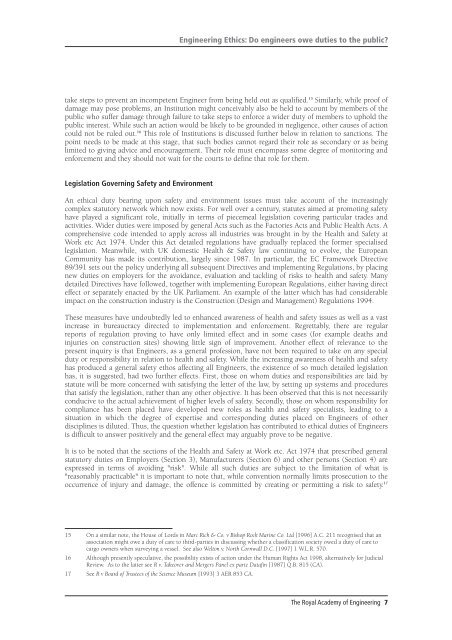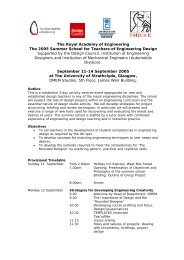Engineering Ethics: Do engineers owe duties to the
Engineering Ethics: Do engineers owe duties to the
Engineering Ethics: Do engineers owe duties to the
You also want an ePaper? Increase the reach of your titles
YUMPU automatically turns print PDFs into web optimized ePapers that Google loves.
<strong>Engineering</strong> <strong>Ethics</strong>: <strong>Do</strong> <strong>engineers</strong> <strong>owe</strong> <strong>duties</strong> <strong>to</strong> <strong>the</strong> public?<br />
take steps <strong>to</strong> prevent an incompetent Engineer from being held out as qualified. 15 Similarly, while proof of<br />
damage may pose problems, an Institution might conceivably also be held <strong>to</strong> account by members of <strong>the</strong><br />
public who suffer damage through failure <strong>to</strong> take steps <strong>to</strong> enforce a wider duty of members <strong>to</strong> uphold <strong>the</strong><br />
public interest. While such an action would be likely <strong>to</strong> be grounded in negligence, o<strong>the</strong>r causes of action<br />
could not be ruled out. 16 This role of Institutions is discussed fur<strong>the</strong>r below in relation <strong>to</strong> sanctions. The<br />
point needs <strong>to</strong> be made at this stage, that such bodies cannot regard <strong>the</strong>ir role as secondary or as being<br />
limited <strong>to</strong> giving advice and encouragement. Their role must encompass some degree of moni<strong>to</strong>ring and<br />
enforcement and <strong>the</strong>y should not wait for <strong>the</strong> courts <strong>to</strong> define that role for <strong>the</strong>m.<br />
Legislation Governing Safety and Environment<br />
An ethical duty bearing upon safety and environment issues must take account of <strong>the</strong> increasingly<br />
complex statu<strong>to</strong>ry network which now exists. For well over a century, statutes aimed at promoting safety<br />
have played a significant role, initially in terms of piecemeal legislation covering particular trades and<br />
activities. Wider <strong>duties</strong> were imposed by general Acts such as <strong>the</strong> Fac<strong>to</strong>ries Acts and Public Health Acts. A<br />
comprehensive code intended <strong>to</strong> apply across all industries was brought in by <strong>the</strong> Health and Safety at<br />
Work etc Act 1974. Under this Act detailed regulations have gradually replaced <strong>the</strong> former specialised<br />
legislation. Meanwhile, with UK domestic Health & Safety law continuing <strong>to</strong> evolve, <strong>the</strong> European<br />
Community has made its contribution, largely since 1987. In particular, <strong>the</strong> EC Framework Directive<br />
89/391 sets out <strong>the</strong> policy underlying all subsequent Directives and implementing Regulations, by placing<br />
new <strong>duties</strong> on employers for <strong>the</strong> avoidance, evaluation and tackling of risks <strong>to</strong> health and safety. Many<br />
detailed Directives have foll<strong>owe</strong>d, <strong>to</strong>ge<strong>the</strong>r with implementing European Regulations, ei<strong>the</strong>r having direct<br />
effect or separately enacted by <strong>the</strong> UK Parliament. An example of <strong>the</strong> latter which has had considerable<br />
impact on <strong>the</strong> construction industry is <strong>the</strong> Construction (Design and Management) Regulations 1994.<br />
These measures have undoubtedly led <strong>to</strong> enhanced awareness of health and safety issues as well as a vast<br />
increase in bureaucracy directed <strong>to</strong> implementation and enforcement. Regrettably, <strong>the</strong>re are regular<br />
reports of regulation proving <strong>to</strong> have only limited effect and in some cases (for example deaths and<br />
injuries on construction sites) showing little sign of improvement. Ano<strong>the</strong>r effect of relevance <strong>to</strong> <strong>the</strong><br />
present inquiry is that Engineers, as a general profession, have not been required <strong>to</strong> take on any special<br />
duty or responsibility in relation <strong>to</strong> health and safety. While <strong>the</strong> increasing awareness of health and safety<br />
has produced a general safety ethos affecting all Engineers, <strong>the</strong> existence of so much detailed legislation<br />
has, it is suggested, had two fur<strong>the</strong>r effects. First, those on whom <strong>duties</strong> and responsibilities are laid by<br />
statute will be more concerned with satisfying <strong>the</strong> letter of <strong>the</strong> law, by setting up systems and procedures<br />
that satisfy <strong>the</strong> legislation, ra<strong>the</strong>r than any o<strong>the</strong>r objective. It has been observed that this is not necessarily<br />
conducive <strong>to</strong> <strong>the</strong> actual achievement of higher levels of safety. Secondly, those on whom responsibility for<br />
compliance has been placed have developed new roles as health and safety specialists, leading <strong>to</strong> a<br />
situation in which <strong>the</strong> degree of expertise and corresponding <strong>duties</strong> placed on Engineers of o<strong>the</strong>r<br />
disciplines is diluted. Thus, <strong>the</strong> question whe<strong>the</strong>r legislation has contributed <strong>to</strong> ethical <strong>duties</strong> of Engineers<br />
is difficult <strong>to</strong> answer positively and <strong>the</strong> general effect may arguably prove <strong>to</strong> be negative.<br />
It is <strong>to</strong> be noted that <strong>the</strong> sections of <strong>the</strong> Health and Safety at Work etc. Act 1974 that prescribed general<br />
statu<strong>to</strong>ry <strong>duties</strong> on Employers (Section 3), Manufacturers (Section 6) and o<strong>the</strong>r persons (Section 4) are<br />
expressed in terms of avoiding "risk". While all such <strong>duties</strong> are subject <strong>to</strong> <strong>the</strong> limitation of what is<br />
"reasonably practicable" it is important <strong>to</strong> note that, while convention normally limits prosecution <strong>to</strong> <strong>the</strong><br />
occurrence of injury and damage, <strong>the</strong> offence is committed by creating or permitting a risk <strong>to</strong> safety. 17<br />
15 On a similar note, <strong>the</strong> House of Lords in Marc Rich & Co. v Bishop Rock Marine Co. Ltd [1996] A.C. 211 recognised that an<br />
association might <strong>owe</strong> a duty of care <strong>to</strong> third-parties in discussing whe<strong>the</strong>r a classification society <strong>owe</strong>d a duty of care <strong>to</strong><br />
cargo owners when surveying a vessel. See also Wel<strong>to</strong>n v. North Cornwall D.C. [1997] 1 W.L.R. 570.<br />
16 Although presently speculative, <strong>the</strong> possibility exists of action under <strong>the</strong> Human Rights Act 1998, alternatively for Judicial<br />
Review. As <strong>to</strong> <strong>the</strong> latter see R v. Takeover and Mergers Panel ex parte Datafin [1987] Q.B. 815 (CA).<br />
17 See R v Board of Trustees of <strong>the</strong> Science Museum [1993] 3 AER 853 CA.<br />
The Royal Academy of <strong>Engineering</strong> 7

















